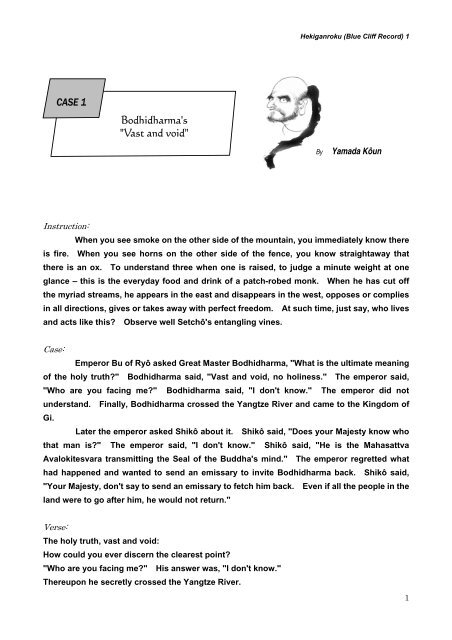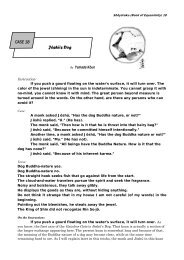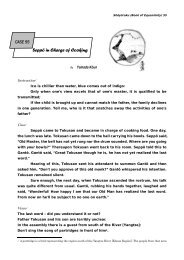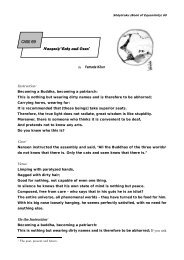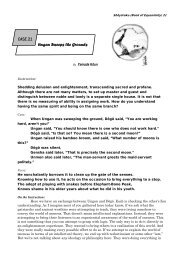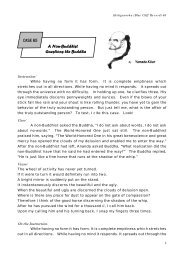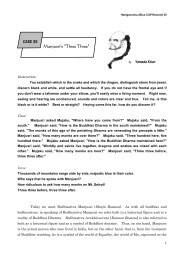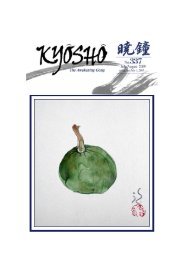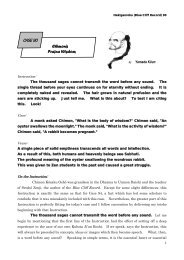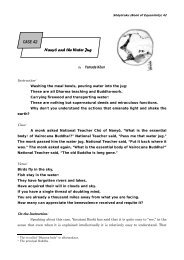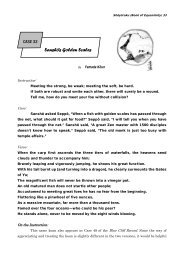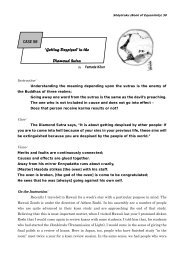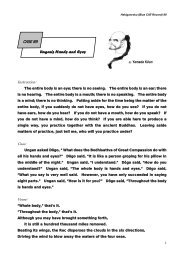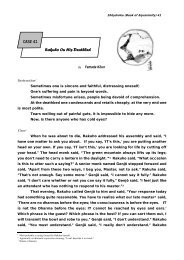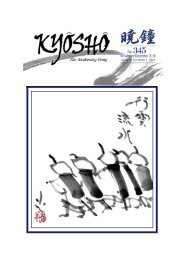Bodhidharma's "Vast and void" CASE 1
Bodhidharma's "Vast and void" CASE 1
Bodhidharma's "Vast and void" CASE 1
- No tags were found...
Create successful ePaper yourself
Turn your PDF publications into a flip-book with our unique Google optimized e-Paper software.
Hekiganroku (Blue Cliff Record) 1itself. The one who is thinking can never be objectified; it is the thinking subject itself. Forexplanation's sake we can think of this in terms of an airplane <strong>and</strong> the vapor trail it leavesbehind. Consider the vapor trail to be the object <strong>and</strong> the airplane to be the subject. Thesubject flies through the air while continually spewing the object from the rear. I can considermyself. I can even consider my self considering, <strong>and</strong> so on ad infinitum. It is just like theairplane which endlessly leaves a vapor trail behind it as it flies. But the one who isconsidering is not the vapor trail. That one can never be objectified. Take an intellectualapproach <strong>and</strong> you inevitably end up with a dual structure. Hisamatsu Shin' ichi refers to Zenpractice as the way of the absolute subject. It is the way of the subject which can never beobjectified. Many of the great Zen personages of the past started out on a path of intellectualor philosophical studies of Buddhist doctrine <strong>and</strong> then came to an impasse when they realizedthat living experience was the only true way. Their numbers include people like theabove-mentioned Great Master Yôka as well as Master Rinzai <strong>and</strong> Master Tokusan. Suchpeople show us that no matter how far we may have advanced in intellectual pursuits, it is stillnecessary to sit <strong>and</strong> realize. Let me quote again from the Shôdôka:From my youth I piled studies,I searched in sastras <strong>and</strong> looked in sutras.Incessantly I classified terms <strong>and</strong> forms;I entered the sea to count the s<strong>and</strong>s – all in vain.Then the Tathagata rebuked me kindly:"What gain is there in counting other people's treasure?"Thus I learned that I had been wearing myself out uselessly,For years I had been dust blown in the wind.On the Case:Emperor Bu of Ryô asked Great Master Bodhidharma. Bodhidharma is the 28thpatriarch after Shakyamuni. He is said to have been the third son of King Kôshi in southernIndia. He was the dharma successor to the 27th patriarch, the Reverend Hannya Tara. Itseems that he was with his master for quite a long time even after the completion of hisenlightenment. When Bodhidharma formally renounced the world [shukke] <strong>and</strong> received thedharma from Hannya Tara, the Reverend Master told his disciple, "Although you have attainedthe dharma, stay in southern India for a while. Sixty-seven years after my death, however,you will depart for China to spread the dharma there." Bodhidharma is, therefore, supposedto have been almost 120 years old when he came to China. He is said to have attained an ageof about 150 when he died. At any rate, he must have been quite an old man. According tolegend it took him three years to sail over to China, since his tiny ship was battered severaltimes by heavy storms. He first l<strong>and</strong>ed in Kôshû, <strong>and</strong> met Emperor Bu of Ryô, who wasgoverning the region at that time. So the story dates back about 1400 or 1500 years. The4
Hekiganroku (Blue Cliff Record) 1emperor was quite well versed in Buddhist teachings. It is reported that he wore monk'sclothes <strong>and</strong> preached on the Hôkô Hannya Sutra. Since the emperor was devoted toBuddhism, Bodhidharma went to see him, evidently hoping to open up the emperor's eyes bywhatever means necessary."What is the ultimate meaning of holy reality?" The ultimate meaning of holy realitymeans the ultimate truth of Buddhism. "Profane reality" [zokutei] means the truth of thephenomenal world, "true reality" [shintei] means the truth of the world of essence, "holyreality" [shôtei] is that which transcends these two. So, the emperor asked about the last <strong>and</strong>ultimate truth.Bodhidharma said, "<strong>Vast</strong> <strong>and</strong> void, no holiness." This is the main point of the koan.The word "holy" has, like other similar words such as "saint" or "sacred," connotations of beingworthy <strong>and</strong> respectful. But according to Bodhidharma, "it is like the autumn sky without acloud, completely clear. No such thing as 'holiness' exists." Thus he is presenting the realfact as "<strong>Vast</strong> <strong>and</strong> void, no holiness." But the emperor Bu is still adhering to the idea of"holiness." He esteems Bodhidharma as a highly venerable man, as a saint.The emperor said, "Who are you, facing me?" Who are you then, sir?Bodhidharma said, "I don't know." The emperor did not match him. The emperor did notunderst<strong>and</strong> what Bodhidharma said. The two did not match each other. So Bodhidharmagave up.Finally, Bodhidharma crossed the Yangtze River <strong>and</strong> came to the kingdom of Gi.He left the southern part of the l<strong>and</strong>, crossed the Yangtze River <strong>and</strong> went over to the northernarea.Later the emperor asked Shikô about it. The emperor told what had happened toShikô <strong>and</strong> asked him about it. Now this Shikô 2 was not an easy fellow to deal with. Onelegend about him goes like this: One day people heard a crying voice, like that of a baby, in abird's nest up a tree. So they brought down the nest, <strong>and</strong> inside they found a baby with clawslike those of a hawk. – It seems that Shikô was a man who had attained the experience of"falling off of body <strong>and</strong> soul" already at his birth. There is also an interesting story about himtogether with a famous layman named Fu-Daishi [the Great One Fu]. Fu was asked by theemperor Bu of Ryô to make a lecture on the Diamond Sutra. "Daishi then went up to therostrum, hit the pulpit once, <strong>and</strong> came down." He simply hit the desk once – WHACK! – <strong>and</strong>came back. "The emperor Bu was dumb-founded." The emperor did not underst<strong>and</strong> thecompassionate action of Fu-Daishi. So "Shikô said, 'Daishi has finished his lecture, yourMajesty."' In our koan too, the same Shikô is asked by the emperor what kind of a manBodhidharma is.Shikô said, "Does your Majesty know who that man is?" Do you know, your Majesty,2A monk greatly trusted by Emperor Bu. His real name was Hôshi or Hoshi (418/425-514), he had long hair,walked bearfoot in the city, wielding a long staff with a pair of scissors <strong>and</strong> a mirror on it. Mysterious as he was, heis said to have been able to appear in many different forms.5
Hekiganroku (Blue Cliff Record) 1who Bodhidharma really is? The emperor said, "I don't know." Then Shikô, moved bycompassion for the emperor, takes advantage of the visit by Bodhidharma in order to awakenthe emperor:Shikô said, "He is the Mahasattva Avalokitesvara transmitting the Seal of theBuddha's mind." He is the incarnation of Kannon, transmitting the true substance ofShakyamuni's enlightenment.The emperor regretted what had happened <strong>and</strong> wanted to send an emissary to inviteBodhidharma back. The emperor realized he had made a mistake. If that man was such agreat person, I shouldn't have let him go away. I'm sorry for what I did, let somebody go afterhim <strong>and</strong> ask him to come back.Then Shikô said, "Your Majesty, don't say to send an emissary to fetch him back.Even if all the people in the l<strong>and</strong> were to go after him, he would not return." Even if all thepeople in the country of Ryô went to get him back, he would never come back. But this makesthe emperor Bu all the more regretful. It is said that he thereupon composed a poem,"Yearning after him in vain for thous<strong>and</strong>s <strong>and</strong> tens of thous<strong>and</strong>s of years …," <strong>and</strong> had it carvedin stone. In reality, Bodhidharma never goes away nor comes back. Not only Bodhidharma,but our true nature is like this. It does not get born, it does not die, it does not go anywhere –this is how our true nature is. Bodhidharma went to the l<strong>and</strong> of Gi, but only formally <strong>and</strong>externally. The true essence knows no going or coming. The real fact is as immense as thewhole universe. How could it ever "go away" or "come back"?On the Verse:Holy reality, vast <strong>and</strong> void. Not even a speck of cloud is in sight. Nowhere existssuch things as "holiness" or "Buddha".How could you ever discern the clearest point? "The clearest point" means theself-evident fact. That which is simply there. Why can't you see the thing itself which issimply there? The one who wants to see it is the "it" itself, so how could you ever see "it"?The emperor said, "Who are you, facing me?" <strong>Bodhidharma's</strong> answer was, "I don'tknow." In Zen we speak about the "time-place-circumstances" [ji-sho-i]. Everything must bein accord with its own time, place <strong>and</strong> circumstances. Since the partner in the dialogue is anemperor, a type of response proper to that situation is needed. The same is true also when youcome to dokusan.Thereupon he secretly crossed the Yangtze River, because this meeting with theemperor had been fruitless.How could the growth of thorns <strong>and</strong> brambles be avoided? Bodhidharma went overto the l<strong>and</strong> of Gi <strong>and</strong> "faced the wall," sitting for nine years. This was, however, the beginningof all our troubles, like enlightenment, koans <strong>and</strong> so on. "If you had done nothing <strong>and</strong> justbeen quiet, you could have manifested the essence in its purest form. But look what6
Hekiganroku (Blue Cliff Record) 1happened! You, Bodhidharma, are responsible for all that!" – the phrase seems to suggestsuch a nuance.Even if all the people in the l<strong>and</strong> went after him, he would not come back. Even ifall the people in the country chased after him to fetch him back, he would not return – sincethere is nothing !He (the emperor) yearns after him in vain for thous<strong>and</strong>s <strong>and</strong> tens of thous<strong>and</strong>s ofyears. Our own life is very similar to this. Give up yearning! What limit is there to the purewind circling the earth? A pleasant wind is blowing over the earth. Is it the autumn wind?It could be the spring wind. What on earth is it? Is it the same as Bodhidharma or different?If you have the eye to see, you can see. Give up your yearning to bring Bodhidharma back.Where is the real fact? The rain, the clouds – everything in the phenomenal world is thecomplete manifestation of the essential world. Please savor well this endlessly pure wind.Looking around to right <strong>and</strong> left, the master said – the "master" means Master Setchô,for here speaks another monk who inserted this – Is the patriarch here? I wonder ifBodhidharma is here. No one seems to have responded."Yes," he answered himself. Setchô himself answered, "Oh yes, there's one". "Callhim here! I will make him wash this old monk's feet." Everybody believes thatBodhidharma is a very great man who came from India to China. Call him then, I will havehim wash my feet. I believe this makes it clear who the true Bodhidharma is.7


